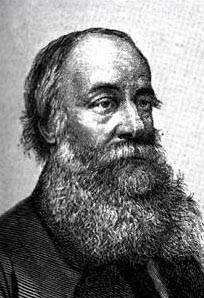James Prescott Joule
Joule, James Prescott
James Prescott Joule (1818-1889), an English physicist, made fundamental contributions to the study of heat and energy. Joule determined the mechanical equivalent of heat by measuring change in temperature produced by the friction of a paddlewheel attached to a falling weight in the 1840s. Although German physicist Julius Robert von Mayer had made the same discovery independently of Joule a few years earlier, it was Joule who received the credit. Joule made a series of measurements and found that, on average, a weight of 772 pounds falling through a distance of one foot would raise the temperature of one pound of water by 1° F. This corresponds to 772 ft lbs × 1.356 J/ft lb = 59,453.6 Calories or 1 cal = 4.15 Joules; this is in close agreement with the current accepted value of 1 cal = 4.184 J. These findings contradicted the "caloric theory,” which embodied the day's widespread belief that heat was a fluid that could be neither created nor destroyed. Joule, on the other hand, claimed that heat was only one of many forms of energy and only the sum of all forms was conserved. This formed the basis for the theory of conservation of energy (the First Law of Thermodynamics). He also worked with Lord Kelvin to develop the absolute scale of temperature, made observations on magnetostriction, and found the relationship between the flow of current through a resistance and the heat dissipated, now called Joule's law. The joule (symbol J, also called Newton meter, or coulomb volt) is the SI unit of energy and work.
Further Reading
- James Prescott Joule Web Site, Michigan State University. The Life and Times of James Prescott Joule.
